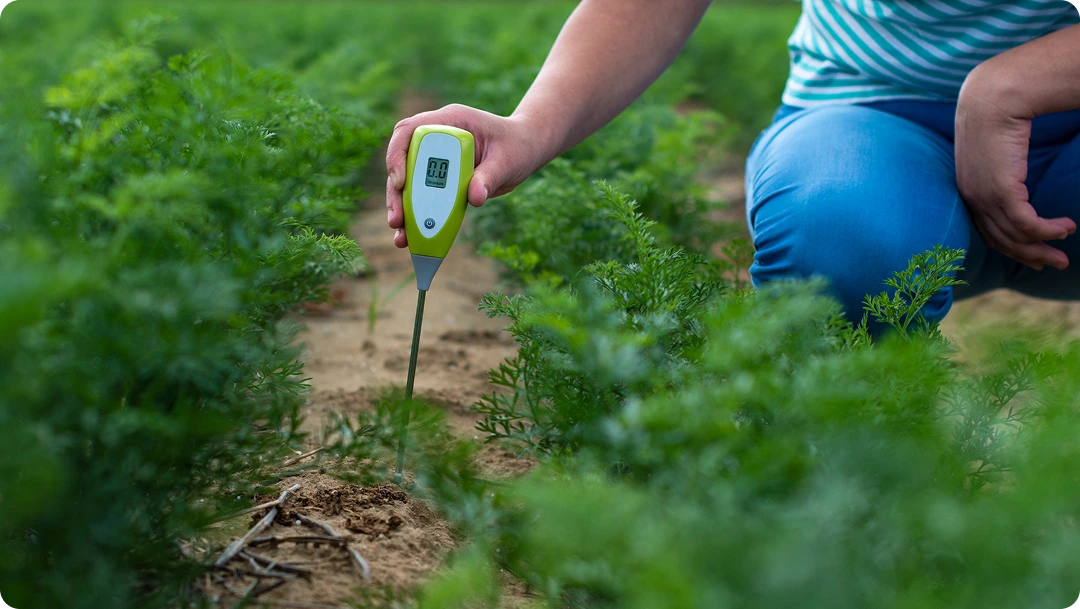

Remember when farming meant squinting at the sky and praying for rain? Those days are fading. Today, a farmer in Madhya Pradesh wakes at 5 AM, checks his phone, not the sky. An alert reads, “Block 2 is low on moisture, irrigate 40 litres/plant today.” He turns on drip valves from bed. By noon, yield projections jump 12%. No wasted water. No stressed crops.
That’s the shift. From gut-feel farming to precision agriculture technology where every drop, seed, and spray is measured, mapped, and maximised.
This isn’t luxury. It’s survival in a changing climate. In India, 40% of water is wasted, and ₹1.5 lakh crore lost yearly to wrong inputs (NITI Aayog). Precision agriculture technology flips that script by turning guesswork into guaranteed gains.
Crop Analytica makes it real for farmers, FPOs, and businesses.
With one app, you get live soil data, AI alerts, and yield forecasts
All designed to save costs, boost output, and protect the land.
Let’s walk the field together.
Precision agriculture technology means farming with pinpoint accuracy, using data to farm exactly where, when, and how much you need, nothing more. No more blanket spraying. No more “let’s hope it rains.”
It’s about knowing your farm better than ever. A patch of land might look uniform from the tractor seat, but underground, pH varies, nutrients dip, and moisture pockets hide. Crop Analytica reveals these secrets, letting you act exactly where needed.
For small farmers juggling loans and labour, this means fewer failed crops and more money in the bank. FPOs use it to standardise quality across 100+ members. Agribusinesses lock in supply chains with predictable volumes..
Crop Analytica bundles it all into ONE app.
IoT devices, Satellite maps, AI dashboards → One app. Full control.
One wrong fertilizer batch can lock nutrients for 3 years.
One dry spell can wipe out 30% yield.
Precision stops both—before they start.
Precision agriculture technology isn’t just profitable, it’s Earth’s best friend.
It tackles the big three crises: water scarcity, chemical overload, and soil death.
India uses 80% of freshwater on farms. But 40% evaporates or runs off.
Smart irrigation via Crop Analytica:
Result?
“My borewell used to dry by May. Now it lasts till July.” – Sunita, FPO, Rajasthan
Indian farmers apply 50% more urea than needed (FAO).
Precision fix:
Outcome:
Blanket spraying kills pollinators. 30% of food depends on them.
Precision pest control:
Win-win:
Crop Analytica’s pest alerts → act in 24 hrs, save 80% of crop.
Soil: Depleted & eroded → Nutrient-rich balance | RESULT: Decades longer life
Bonus:
Crop Analytica’s soil sensors deliver live nutrient reports
No guesswork, No waste.
Problem: Uneven yields. North side is barren, where as the south is lush.
Solution: Crop Analytica’s soil grid mapping (100m x 100m zones).
Action: Variable-rate fertiliser, 40% less in rich zones.
Result:
“I thought my land was cursed. Turns out, it just needed data.” – Shankar, FPO leader
Old way: Pump ran 6 hrs/day → water table dropped 2 M/year.
Crop Analytica fix:
Now?
AI alert: “High thrips risk in 3 days.”
Farmer sprayed only 25% of the plantation.
Saved:
All from one notification.
Crop Analytica’s Crop Yield Prediction Software
Tells you expected harvest 60 days early
Resist the urge to completely transform your farm.
Try this:
Return on investment in 30 days. Guaranteed!
Tomorrow’s farm isn’t bigger, it’s smarter.
India’s goal:50% water savings by 2030 (Jal Shakti).
Precision agriculture technology is the engine.
Crop Analytica leads with Sustainable Farming Solutions
→ From sensor to subsidy—full support.
Precision agriculture technology isn’t optional.
It’s how you farm profitably in a 1.5°C warmer world.
One sensor. One alert. One season changed.
Take the first step with Precision Agriculture Technology:
👉 Book a free farm audit
📱 Download Crop Analytica
🌾 Join 18,000+ precision pioneers
Tap to farm the future → Get Started Now